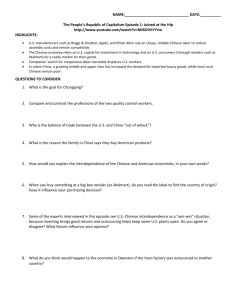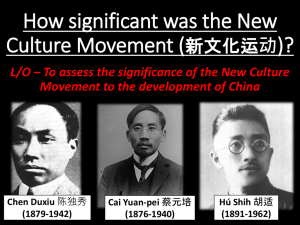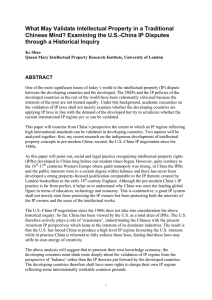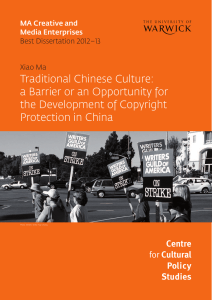Dia 1 - iKi Beer
advertisement
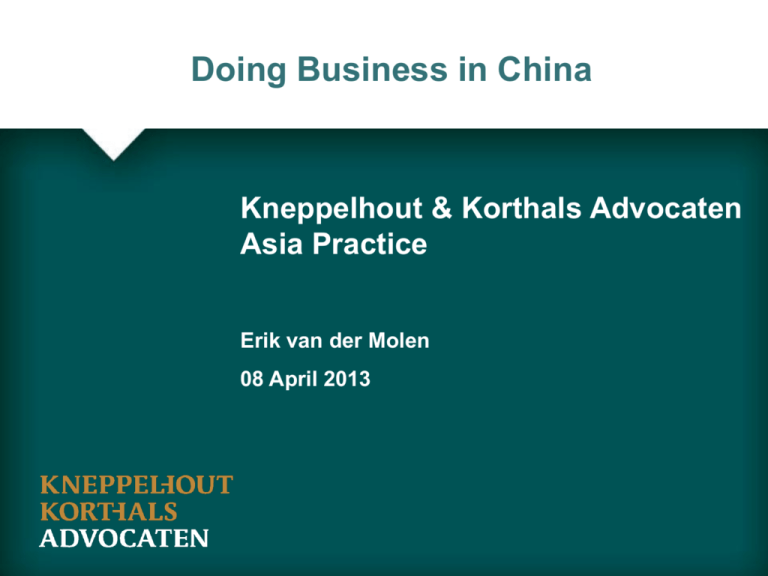
Doing Business in China Kneppelhout & Korthals Advocaten Asia Practice Erik van der Molen 08 April 2013 Introduction Kneppelhout & Korthals: • • • Independent Law Firm focusing on Trade, Investment & Intellectual Property Asia Desk with a focus on China, Vietnam & Japan Serving Small & Medium Sized Companies Why Asia is Important 1 Share of world population: Share of world output growth: Visualising China’s growth 1 1990 2012 2030? Balance shift? Or Return to normal? Visualising China’s Growth 2 China's economy grew 7 times as fast as America's over the past decade (316% growth vs. 43%) One in five people in the world is Chinese one-fifth of the global construction industry 3 new powerplants every week 5000 new hospitals in the next 30 years 240 million cars China’s economy will surpass the US in 2025 A Growing Urban Middle Class 220 million internet shoppers 240 million cars 564 million internet users 240 million cellphones sold in 2013 25% of world luxury product market Developments • Ongoing Economic Transformation • Fast growing urban middle class giving rise to new demands. (creative & luxury markets) • From made in China to designed in China • Chinese companies going global • Rest of Asia will grow in China’s wake: Vietnam, Laos, Cambodia, Mongolia, Myanmar, Mongolia Why go to China? To summarize: • A focus on China / Asia is no longer an option, it is a necessity. • No China/Asia strategy means: - Losing from the competition that does have an Asia focus - Losing from the competition that will emerge from Asia itself. • Don’t underestimate the speed and scale of developments • If you wait until China is ready for your product, you are too late. The End of Cheap China? Case: Apple Manufacturing Market - Production in China can still be interesting. - China is getting more expensive, but it is not only about price. (scale/flexibility) - Upcoming alternatives in the region: Vietnam, Thailand, Myanmar, Mongolia. Apple’s executives had estimated that about 8,700 industrial engineers were needed to oversee and guide the 200,000 assembly-line workers eventually involved in manufacturing iPhones. The company’s analysts had forecast it would take as long as nine months to find that many qualified engineers in the United States. In China, it took 15 days. The Other Side of the Medal Many Opportunities in China but Challenges abound: Business •Finding the right partner •Quality Control •Knowing the market Culture • Negotiation • Relationships • Business Culture Legal •Fraud •Corruption •Intellectual Property •Contracts The 4 P’s of Doing business in China Preparation Patience Perseverance Prudence Causes of Failure: • • • • Choosing the wrong partner Short-term orientation Underestimating the cultural factor Insufficient legal protection The 4 P’s of Doing business in China Invest in Relationships Know the Culture -Personal Contact. -Regular Contact -Network - Negotiation Tactics - ‘Face’ and “Hierarchy” - Indirect Commucation -Language CHINA SUCCESS: Know the Market - Where is your market? - Who are the players? - How fast the market developing. - Where is the market developing. Protect Yourself - Know who you are doing business with - Protect your intellectual property - Have good contract. Know the Market: China is a continent not a country. Business Culture • • • Relationships & Loyalty make business personal, reciprocity, long term relations Hierarchy & Face show respect, formality, not everybody is equal, give face Harmony avoid conflict. In Asia, all business is personal Business Culture: Relationship • • • • Long term View Building a relationship takes time Reciprocity: Give and Take Investing in Relationship will lead to better results Finding a Business Partner Find a Business partner: • Internet • Tradeshows • Dutch Government Network • Third Parties • Join a Trademission • • • • Important to do your Due Diligence! Make sure your partner is a strategic match. Personal Contact is paramount! Beware of known frauds & scams Know who you are dealing with Sourcing / Manufacturing – The absolute basics The Key to Quality Control 1. Understand how the Chinese organization works: management, corruption risks, worker education level. 2. Provide detailed guidance and documentation 3. Factory Presence and Inspection. 4. Take a long-term view: 5. Anticipate what will go wrong and prepare. 6. Always carry a safety stock. Contracts in China A Common Misconception: Contracts in China are meaningless and not enforceable A good contract: • Provide clarity about mutual expectations. • Will help prevent problems. • Will be enforced by a court if. Things to remember: • Include Non-Disclosure/Non-Use/Non-Circumvention Clauses • In Chinese • Choose the right Governing Law • Consider Arbitration Clauses • Find a balance between a good contract and a good relationship • Negotiations will continue after contract has been signed Intellectual Property Rights • • • • Always Register Trademarks in China. Contractually Protect Your IPR. It is possible to go after copycats, but is it worth it? Protect your production processes Conclusion • • • • • • • The time to go to Asia is now. Don’t rush into a relationship; know who you do business with. Choose a partner with a long term view in mind. Put time and effort in personalizing relationship. Know the culture or work with people who do. Don’t underestimate the speed and scale of developments Take basic steps to protect yourself legally Questions? How to set up a legal entity in China? How to secure my interests in a contract with my Chinese distributor? How to protect my intellectual property in China? Which legal entity /structure is best for my business? How to structure my China operations financially? What to put in a sourcing contract with a Chinese supplier? You can contact Questions? Contact information Erik van der Molen Tel.: +31 010 400 5100 E-mail: evdm@kneppelhout.nl





